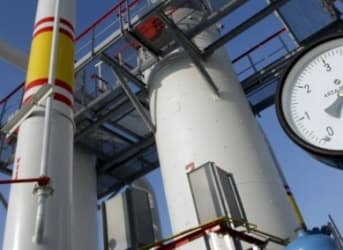Persistently low oil prices have already inflicted economic pain on oil-producing countries. But with crude sticking near six-year lows, the risk of political turmoil is starting to rise.
There are several countries in which the risks are the greatest – Algeria, Iraq, Libya, Nigeria, and Venezuela – and RBC Capital Markets has labeled them the “Fragile Five.”
Iraq, facing instability from the ongoing fight with ISIS, has seen its problems compounded by the fall in oil prices, causing its budget to shrink significantly. The government is moving to tap the bond markets for the first time in years, looking to issue $6 billion in new debt.
Revenues have been bolstered somewhat by continued gains in production. Iraq’s oil output hit a record high in July at 4.18 million barrels per day, up sharply from an average of 3.42 million barrels per day in the first quarter of this year. But with Brent crude now dropping well below $50 per barrel, Iraq’s finances are worsening. According to Fitch Ratings, Iraq may post a fiscal deficit in excess of 10 percent this year, and all the savings accrued during the years of high oil prices have been depleted. Related: EPA Cracking Down On U.S. Methane Waste
Other political problems loom for Iraq. The central government and the semiautonomous region of Kurdistan have been unable to resolve a dispute over oil sales. With revenues running low for the central government, it has failed to transfer adequate funds to the Kurdish Regional Government (KRG). That led to the breakdown of a tenuous deal between the two sides that saw Kurdish oil sold under the purview of the Iraqi government. The KRG is selling oil on its own now in an effort to obtain much needed revenue in order to pay private oil companies operating in its territory.
Meanwhile, in southern Iraq, which produces the bulk of the country’s oil and has been far from the violence associated with ISIS, protests have threatened oil operations there. Protests at the West Qurna-2 oilfield operated by Russian firm Lukoil have raised concerns within both the company and the Iraqi central government about disruptions. The Prime Minister even traveled to the site to reassure Lukoil about the stability of its operations.
“Recent pressure from villagers and nearby residents making demands could force us to consider halting operations if they keep extorting us,” a Lukoil official reportedly said. Disruptions don’t appear to be imminent, but any cutback in production would be a huge blow to Baghdad and would plunge Iraq deeper into financial despair. Related: Is This The Best Play In U.S. Oil?
Low oil prices could also push Venezuela into a deeper crisis. The cost of insuring Venezuelan government bonds has hit its highest level in 12 years, indicating the growing probability of default. Critical parliamentary elections loom in December, but the government has already cracked down on opposition candidates and will likely prevent a fair election from taking place, even while President Maduro’s popularity sinks. The economy is already in crisis, but it is teetering on the brink of something more acute. Bloomberg’s editors openly wonder whether Venezuela’s neighbors are prepared for its collapse.
For Libya, already torn apart by civil war and the growing presence of ISIS militants, low oil prices are the last thing the country needs. ISIS violently crushed a civilian rebellion last week in the coastal city of Sirte, according to Al-Jazeera. Libya’s internationally-recognized government has called upon Arab states for help in fighting ISIS, something that the Arab League has endorsed. Meanwhile, the country’s oil sector – the backbone of the economy – is producing less than 400,000 barrels per day, well below the 1.6 million barrels per day Libya produced during the Gaddafi era. In other words, Libya is selling far less oil than it used to, and at prices far below what they were as recently as last year. Citing IMF data, Bloomberg says that oil is selling for almost $160 per barrel less than what Libya would need it to be for its budget to breakeven. Related: Low Oil Prices And China Pull The Rug From Under Latin America
Saudi Arabia does not belong in the same category of troubled countries, but it is also not immune to oil prices at multiyear lows, despite its vast reserves of foreign exchange. Saudi Arabia could run a fiscal deficit that is equivalent to about 20 percent of GDP. To finance public spending, Saudi Arabia has returned to the bond markets for the first time in eight years, issuing 15 billion riyals ($4 billion) in July, only to be followed up by an additional bond offering of 20 billion riyals ($5.33 billion) in August. The government plans on taking on more debt in the coming months as well.
Still, Saudi Arabia has a market share strategy that it is pursuing, and there are no signs that it will reconsider. That could spell trouble for much more fragile oil-producing countries around the world.
By Nick Cunningham of Oilprice.com
More Top Reads From Oilprice.com:
- A Key Tool For Energy Investors
- More Rotten News For The Commodities Markets
- How Much Pressure Will Iran Put On Oil Prices?


















